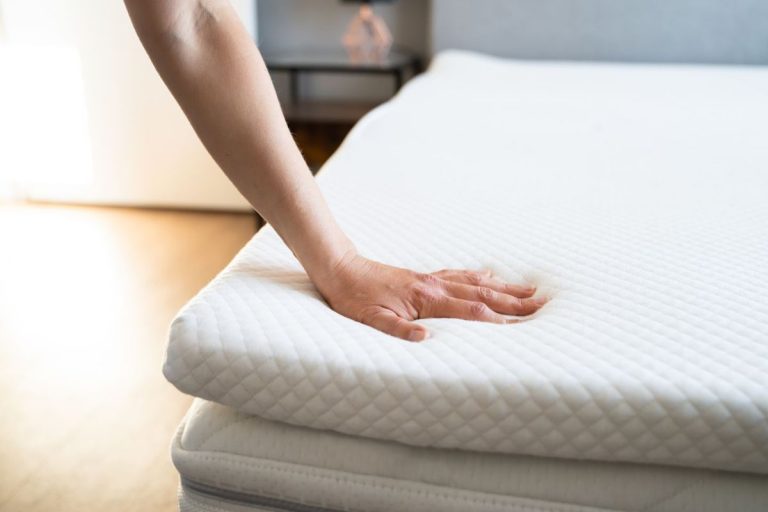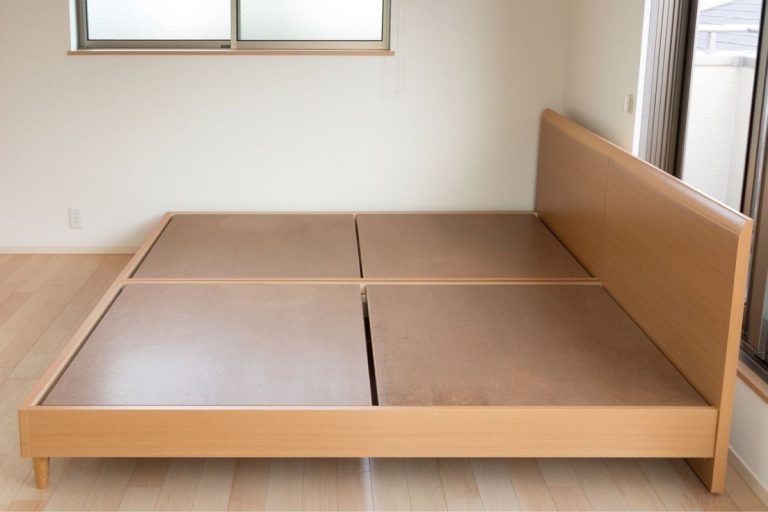Humans are known to spend about one-third of their life sleeping. We need sleep, in order to function properly and get our daily tasks complete in time. Additionally, sleep is important for our overall health, as well as our cognitive, emotional, and mental health. However, besides the mental sleep disorders such as insomnia, various conditions can make us more susceptible to choking while asleep.
If you’re concerned about choking on vomit while asleep due to some conditions such as GERD, sleep apnea, or some other conditions associated with acid reflux and heartburn, you should continue reading this article.
Primarily, getting diagnosed by your doctor promptly can increase the likelihood of your condition being easier to control. We’ll give you some tips on how to control your sleep endeavor and how to avoid choking on vomit and startling yourself awake.
If you’re a parent and your newborn has been choking on their vomit while being asleep, don’t worry. There are a few sleep and bedtime habits you can practice with your little ones so that they won’t vomit while they’re asleep, let alone choke on it.
We understand that you’re probably panicking right now and worrying about your sleep health, and the health of your little ones. It’s worth noting that these things happen rarely, but it’s still good to have a few tricks under your sleeve on how to tackle this problem with choking.
If you continue reading this article, you’ll be able to put your GERD symptoms under control, which will allow you to sleep soundly and peacefully. Additionally, you’ll be able to help your baby sleep in a healthy position and not frighten yourself about them choking on vomit. Continue reading!
What is GERD?
Gastroesophageal reflux disease, which is also known as GERD, is a chronic disease that affects people aged from 45 and older, although it can be observed in younger populations too. It happens when there’s a stomach acid buildup that then flows into your esophagus.
Given that this condition is irritating to your diaphragm, esophagus, larynx, and throat, it can cause disturbing nausea, coughing, and oftentimes choking. Unfortunately, this condition tends to worsen as you lay down and go to sleep, causing heartburn, persistent cough, and even vomiting, which then manifests through different respiratory symptoms.
This disease needs to be diagnosed by your doctor, however, as it can often be mistaken for some other condition or simple heartburn and acid reflux we all feel occasionally after eating a lot. But unlike these acute symptoms that occur now and then, GERD is a chronic condition that needs to be treated and controlled.
Everyone experiences different flare-ups of GERD. For some people, it can happen once to up to 3 times a week, while for others, this chronic condition occurs nearly every day. Other than annoying, this condition is dangerous because it can result in serious health problems such as obstructive sleep apnea, restless leg syndrome, various respiratory problems, and nighttime heartburn.
According to some experts, GERD tends to get worse at night. It has little to do with the time of the day but a lot to deal with what position we sleep in. When laying down, the acid presses onto the esophagus and travels back up into our throat.
When that happens, you may start coughing or even choking, getting the sensation that you’re about to throw up. Oftentimes, this sensation makes people wake up and puts them into a loop where as soon as they’re about to drift into sleep the vomiting and choking sensation would return.
For a lot of people, this sensation is quite disturbing as they’re afraid that they will choke to death. However, whether you’re suffering from GERD or some other condition that may cause you to experience choking on vomit in sleep there are a lot of ways to improve your state and help you sleep.
Don’t forget, being deprived or disturbed of your sleep for too long can cause other conditions and lead to underlying conditions that can worsen your overall health, which is not something you want. Healthy sleep is of utmost importance for everyone regardless of age or health status.
Tips to Prevent Choking on Vomit While Sleeping
If you want to stop or prevent choking on vomit while sleeping there are certain things that you can do to improve your condition immediately. Additionally, there are certain lifestyle changes that you will have to adhere to in order to improve.
Add More Pillows
You can never have enough pillows when sleeping, whether you are a healthy sleeper or someone with GERD or some other condition that causes you to choke in sleep. Some people may add as many as three or four pillows to support their heads while they are sleeping.
GERD can happen regardless of the position that you sleep in but it most commonly happens to people sleeping on their back rather than other positions. However, if you add up more pillows under your head and press the pillows against the bed frame and headboard.
Editor’s note: The only bad part about this is that it may take some time for people to get used to this way of sleeping, especially if you’re a stomach sleeper. Nevertheless, after some time you’ll feel improvement in your sleep quality.
One piece of advice is to put the firmest and hardest pillows on the bottom and add up softer pillows for more support for your head. Softer pillows always feel better, especially if you sleep on your back and not in other sleep positions.
Use a Wedge Pillow
Wedge pillows are popular among people who have obstructed airways which gives them difficulties sleeping. Additionally, it’s popular among people who have GERD because it gives them the necessary elevation that will prevent the acid reflux from going up to your throat and larynx.
That way, you’ll be able to prevent choking, almost immediately. Various manufacturers provide a plethora of wedgie shapes that are adjustable to everyone’s needs. That said, you can choose what works for you and even add more pillows as they come on. Studies have shown that using a wedge helps with alleviation of GERD symptoms during night.
Editor’s notes: Wedge pillows may not be suitable for everyone, but they may also aid in other conditions like sleep apnea and other obstructive conditions that affect sleep.
Also Read: 4 Best Wedge Pillows For Back Pain: Work As Expected?
Pregnancy Pillows
It’s no secret that pregnancy pillows are extremely popular among women who can’t get around sleep during their blessed times. Interestingly, a lot of pregnancy pillows are similar to wedgies. Moreover, a lot of wedgies are available in pregnancy stores so you can choose what suits you better.
A lot of people don’t know, but pregnant women are more likely to experience GERD during the night. Sometimes, the condition may stop after giving birth but in many cases, it persists and lasts after childbirth. That’s why pregnancy and wedgie pillows are an ideal investment during pregnancy.
Also Read: 10 Best Pregnancy Pillow in 2022 (Ultimate Buying Guide & Reviews)
Use Adjustable Bed
This may look like a drastic lifestyle change, but it’s a more suitable one when the GERD is hard to control and the patient is expected to change their lifestyle in entirety because other methods didn’t work.
Adjustable bed frames can be quite expensive, but they also come with numerous benefits, not just for treating GERD or other obstructions, but also other health problems in the legs, hips, back, and other areas that may worsen with age.
There are many adjustable bed brands on the market, Amerisleep is one of the most popular ones when it comes to choosing medically-approved options on the market.
Editor’s notes: Of course, for a lot of people affording an adjustable bed can be complicated, especially if you purchased a new bed frame or mattress recently. If purchasing an adjustable frame is out of your options consider adding bars, pillows, or other objects that will help elevate your mattress so that your head and chest are above your legs.
Read More: Do Adjustable Beds Help Acid Reflux?
Avoid Alcohol
Alcohol is something that many people swear by, but it has so many harms to the overall health status. GERD is one of them. Alcoholic drinks are responsible for horrible acid reflux and can sometimes even worsen the symptoms of GERD.
This doesn’t only have to do with GERD. Alcohol abuse can lead to needing to throw up. If that happens during sleep, you’re more likely to start choking on vomit while sleeping.
Taking alcohol before sleep is not surprising as a lot of people use it to help them sleep. Unfortunately, it’s harmful to use when it comes to GERD symptoms. According to this study, alcohol abuse can worsen the existing GERD condition. Moreover, it can cause serious damage to the esophageal mucosa.
Editor’s notes: It’s worth noting that withdrawal from alcohol can improve the symptoms and repair the damage that was made, according to the same study mentioned earlier. Withdrawal from alcohol while having GERD should be taken seriously, as worsening symptoms can cause damage to your stomach and throat.
Also Read: How Does Alcohol Affect Sleep?
Don’t Sleep Immediately After Eating
A general rule of the thumb of eating and sleeping is to avoid eating too close to your bedtime, around 2 to 3 hours before. This applies to healthy people as much as to people who are prone to vomiting in sleep, and people who have GERD.
If you’re reading carbs, food reach in fats and oils, it’s more likely that your acid reflux symptoms will flare up and that you will feel like choking on mucus or vomit in sleep.
Editor’s notes: If you’re extremely hungry and simply need to eat before sleep avoid food rich in fats and oils. Eat smaller portions and healthier too, such as fiber-rich foods. Avoid eating sweets and fried food as that can worsen the symptoms.
Lose Weight
When we talked about long-term lifestyle changes to take action over when it comes to decreasing the likelihood of choking in sleep, this is what we meant. Losing weight, even if just a bit can improve your GERD symptoms. Being overweight and obese are often the key culprits behind acid reflux and choking in sleep.
Editor’s notes: Moderate exercising and walking, although not too close to sleep, showed a link with weight loss-related improvement of feeling of choking during sleep, as well as GERD. A small study found that moderate exercising can help improve the symptoms of GERD along while helping you lose weight.
Lower On or Quit Smoking
Smoking is already known to have various bad effects on your health. However, one not so often talked about the effect is GERD or even the feeling of choking in sleep. What many people don’t know is that in our esophagus, there’s a small valve that connects it to the stomach.
Frequent smoking can weaken that valve which leads to burning of the acid reflux that can go up to your throat and cause you to choke on vomit in sleep.
Other Causes of Choking on Vomit While Sleeping
GERD is the most commonly known cause of what could cause vomiting sensation in sleep. What’s even worse is choking on it. There are some other, lesser-known conditions or situations where we may be prone to choking on vomit in sleep.
Normally, as mentioned above, heartburn and acid reflux is something that we already know can cause us to vomit in sleep. However, one other situation that may cause us to choke is likely an illness, such as cold, flu, or even the novel COVID-19.
If your illness has caused you to feel congested and led to mucus entering your throat and larynx a lot of people had the sensation of throwing up in sleep, which led them to choke and gasp for air. Sick people may also have problems sleeping due to coughs which may prevent them from breathing naturally.
Other causes that may cause choking in sleep are sleep-related abnormal swallowing which may cause people to choke on their saliva while sleeping. However, this condition is more common in people who have obstructive sleep apnea.
Additionally, some lesions and throat tumors can cause people to choke on their saliva or vomit, or even mucus.
What’s important is to visit your doctor as soon as you can, especially if the choking sensation lasts for a few days and has interfered with your sleep cycle. Your doctor will admit you to the necessary tests and give you the medication and therapy.
How to Prevent Babies From Choking on Vomit in Sleep?
Parents’ biggest fear is for babies to start choking, especially in their sleep. Many experts say that healthy babies should sleep on their backs.
Healthy babies don’t have a problem with GERD or any other condition that could cause acid reflux. However, they tend to fall asleep as soon as they eat, which can put pressure on their digestive system.
For babies, it’s of utmost importance to have them sleep on their back, for at least six months, and oftentimes even longer. Many parents are making them sleep on their back until they’re at least one year old.
One of the main causes of death in babies is SIDS (Sudden infant death syndrome) which is more likely to happen if the baby is sleeping on their stomach or their side. Another problem besides risk is that sleeping on their side or stomach will put pressure on the baby’s esophagus which can ultimately result in them vomiting in sleep.
Babies aren’t self-conscious and may not have the defense mechanisms that will wake them up from sleep if they start choking. Two things that you can do is entertain them for 30 minutes to one hour after nursing so that their small stomachs can start processing the nutrients from breastmilk or formula. Another thing that you can do is simply keep the baby from sleeping on their side or stomach.
Another cause of babies choking in sleep, although not on vomit, can be caused by infant apnea.





